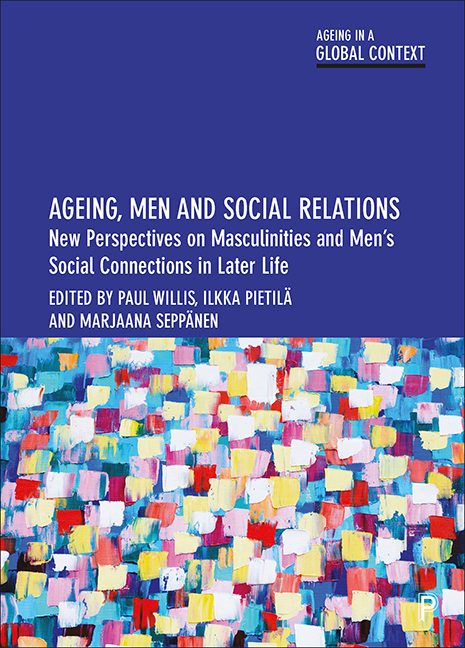 Ageing, Men and Social Relations
Ageing, Men and Social Relations Published online by Cambridge University Press: 18 January 2024
Introduction
Sizeable bodies of qualitative research now report on men’s post-surgical experiences of two cancers – breast cancer in men (BCiM) and prostate cancer (PCa). This chapter targets how cisgender men’s social and bodily ageing may mediate their post-mastectomy narratives compared to the narratives of men post-prostatectomy. Notably, BCiM and PCa are the experiences of ageing men. The median age for men’s breast cancer (BC) diagnosis is about 68 (Konduri et al, 2020); similarly, the median age of a PCa diagnosis is late onset, commonly in men’s mid-to-late 60s (Droz et al, 2010). Few studies have called attention to the place of corporeal and social ageing as an inseparable dimension of men’s cancer journey. As well, we are unaware of any comparative analysis of the experiences of men with BC and men with PCa after their surgical treatment. The diagnosis and treatment of BCiM and PCa are known to fundamentally shake men’s identities as men, drawing into question their embodied masculine self (for example, France et al, 2000; Gray et al, 2002b). By drawing on the available qualitative research literature, we summarise how ageing men wrestle with and talk about the interwoven experiences of getting older and having a gendered cancer.
Cancer, ageing and masculinities
Comparing men’s post-surgical experiences with prostate cancer and breast cancer is particularly salient because they are oppositely gendered cancers in the public imagination. One is the most known and second deadliest cancer among men. Data for the US and the UK estimate that one in eight men in will develop and live with prostate cancer in his lifetime (American Cancer Society, 2021; Cancer Research UK, 2021).
Unlike prostate cancer being a sex-specific disease, breast cancer is not exclusively a malignancy of one sex. Men too have breasts though very rarely breast cancer. BCiM barely accounts for 1 per cent of newly diagnosed BC cases worldwide and represents less than 1 per cent of new cancers diagnosed in men, slightly more than testicular or penile cancer (World Health Organization, 2021).
To save this book to your Kindle, first ensure [email protected] is added to your Approved Personal Document E-mail List under your Personal Document Settings on the Manage Your Content and Devices page of your Amazon account. Then enter the ‘name’ part of your Kindle email address below. Find out more about saving to your Kindle.
Note you can select to save to either the @free.kindle.com or @kindle.com variations. ‘@free.kindle.com’ emails are free but can only be saved to your device when it is connected to wi-fi. ‘@kindle.com’ emails can be delivered even when you are not connected to wi-fi, but note that service fees apply.
Find out more about the Kindle Personal Document Service.
To save content items to your account, please confirm that you agree to abide by our usage policies. If this is the first time you use this feature, you will be asked to authorise Cambridge Core to connect with your account. Find out more about saving content to Dropbox.
To save content items to your account, please confirm that you agree to abide by our usage policies. If this is the first time you use this feature, you will be asked to authorise Cambridge Core to connect with your account. Find out more about saving content to Google Drive.